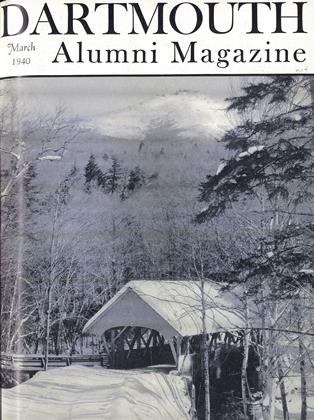DEFERRING HIS appointment, effective Feb. 1, as dean of the School of Business and Civic Administration of the College of the City of New York, DR. HERMAN FELDMAN, professor of Industrial Relations at Tuck School, will finish out the year in Hanover before going to New York. Dr. Feldman has been at Dartmouth since 1923. From 1928 to 1930 he was economic adviser to the United States Personnel Classification Board, and in 1931 research consultant to the Wickersham Commission. He served as chairman of the New Hampshire Commission on Unemployment Reserves from 1933 to 1935, an arbitrator of labor disputes under the National Recovery Act, a member of the National Wages and Hours Apparel Committee, also as investigator for the com- mittee on industrial relations of the Social Science Research Council. In order to accept this post, Dr. Feldman has been granted a two-year leave of absence from Dartmouth.
PROFESSORS E. B. WATSON and HEWETTE E. JOYCE of the English Department have returned from a Sabbatical half-year, in which they visited twenty-four colleges and universities. Leaving Hanover on Aug-15, they headed west, went to Seattle and then followed the coast south to San Francisco. At the University of Minnesota they were entertained by Dean Malcolm Willey formerly of the faculty of Dartmouth College. They were also guests at Vanderbilt and the University of Virginia. In San Francisco, Professor Watson spoke before the Dartmouth Club outlining for the members the plans of the new theater in Hanover. Returning to New York about Dec. i, Professor Joyce went to New Haven for the remainder of the leave and Professor Watson went to Cambridge.
Demobilized from the French Army in which he was a reserve officer, PROFESSOR FRANCOIS DENOEU of the Department of Romance Languages returned to Hanover early in February to resume his work of teaching. His wife and children who had been in France returned with him. As a reserve officer, and visiting his home in France at the outbreak of war, he was called to duty last fall. After three months of inactivity on the Western Front, the older reserve officers were demobilized in January, and through special permission, Professor Denoeu was allowed to come back to Dartmouth.
What is essentially a business course with an engineering background is included in the announcement concerning the new Tuck-Thayer Combined Major. There have been a number of demands for such a major as this, with its training in two fields, from fathers of Dartmouth students who wished them to have preparation for entering such fields as ship-building, mining, and the administration of engineering construction; from members of public service commissions who expressed a preference for graduates well grounded in the fundamentals of both business administration and engineering rather than for those trained only in one field; from graduates of business schools who are engaged in the production and selling of mechanical, technical, and industrial equipment. The schedule worked out under the direction of Dean H. V. Olsen of Tuck School, and Dean Frank W. Garran of Thayer School, includes the usual degree of A. B. at a satisfactory completion of the Senior-year work, and the postgraduate degree of Master of Science in Business Administration and Engineering for an extra year. This Combined Major with the four-year cpurse and the five-year course goes into effect next year. It is an attempt to coordinate the subjects rather than to present them in panel form.
DEANS IN CHARGE OF THE COMBINED BUSINESS-ENGINEERING COURSE Frank W. Garran (left), dean of the Thayer School, and Herluf V. Olsen '22, dean ofthe Tuck School, discuss plans for the curricular innovation which will allow studentsin each school to take a combined two-year business and engineering course.
 View Full Issue
View Full Issue
More From This Issue
-
 Article
ArticleEducation At Its Best
March 1940 By ARTHUR DEWING '25 -
 Sports
SportsBig Green Teams
March 1940 By Whitey Fuller '37 -
 Article
ArticleAn Obligation to Alumni
March 1940 By BEN AMES WILLIAMS '10 -
 Article
ArticleHanover Browsing
March 1940 By HERBERT F. WEST '22 -
 Class Notes
Class Notes1930*
March 1940 By ALBERT I. DICKERSON -
 Article
ArticleThe College in the Sixties
March 1940 By DR. WILLIAM LELAND HOLT
Article
-
 Article
ArticleSELECTIVE PROCESS INSTITUTED FOR THE CLASS OF 1926
January 1922 -
 Article
ArticleAll-Star Coach
June 1947 -
 Article
ArticleBest Club Secretary
-
 Article
ArticleTuck School
February 1944 By A. W. F., G. W. W. -
 Article
ArticleTHE AMOS TUCK SCHOOL
APRIL 1906 By Harlow S. -
 Article
ArticleMedical School
JANUARY 1970 By HARRY W. SAVAGE M '27


